人教版七年级英语下册第十单元学案
人教版七年级英语下册第十单元同步优秀教学案例
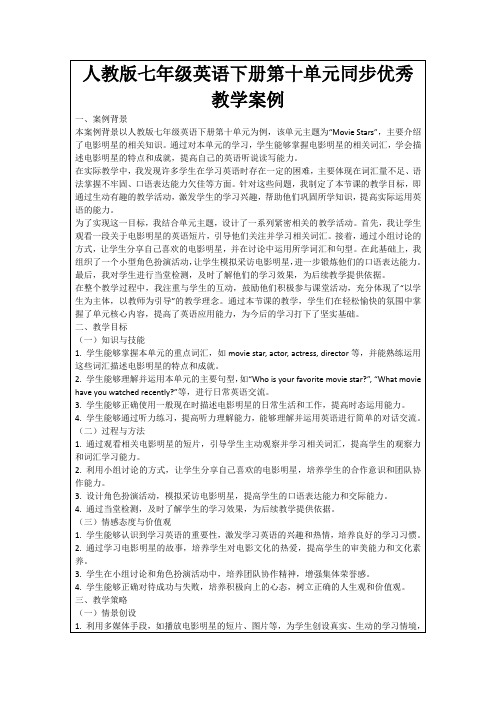
1.通过观看相关电影明星的短片,引导学生主动观察并学习相关词汇,提高学生的观察力和词汇学习能力。
2.利用小组讨论的方式,让学生分享自己喜欢的电影明星,培养学生的合作意识和团队协作能力。
3.设计角色扮演活动,模拟采访电影明星,提高学生的口语表达能力和交际能力。
4.通过当堂检测,及时了解学生的学习效果,为后续教学提供依据。
三、教学策略
(一)情景创设
1.利用多媒体手段,如播放电影明星的短片、图片等,为学生创设真实、生动的学习情境,增强学生的学习兴趣。
2.设计各种教学活动,如角色扮演、小组讨论等,让学生置身于实际的语言环境中,提高学生的语言运用能力。
3.创设各种任务型活动,如采访电影明星、编写电影剧本等,让学生在完成任务的过程中,自然地运用所学知识。
在整个教学过程中,我注重与学生的互动,鼓励他们积极参与课堂活动,充分体现了“以学生为主体,以教师为引导”的教学理念。通过本节课的教学,学生们在轻松愉快的氛围中掌握了单元核心内容,提高了英语应用能力,为今后的学习打下了坚实基础。
二、教学目标
(一)知识与技能
1.学生能够掌握本单元的重点词汇,如movie star, actor, actress, director等,并能熟练运用这些词汇描述电影明星的特点和成就。
(三)情感态度与价值观
1.学生能够认识到学习英语的重要性,激发学习英语的兴趣和热情,培养良好的学习习惯。
2.通过学习电影明星的故事,培养学生对电影文化的热爱,提高学生的审美能力和文化素养。
3.学生在小组讨论和角色扮演活动中,培养团队协作精神,增强集体荣誉感。
4.学生能够正确对待成功与失败,培养积极向上的心态,树立正确的人生观和价值观。
(三)学生小组讨论
人教版七年级英语下册Unit10-教案

Unit 10 I’d like some noodles.Section A (1a-2d)一、教学目标:1. 语言知识目标:1) 能掌握以下单词:noodles, mutton, beef, cabbage, potato, special, would, would like, order, bowl, size, tofu能掌握以下句型:①—What would you like?②—I'm not sure yet. Are there any vegetables in the beef noodles?③May I take your order?④—Can we have two bowls of beef soup then?—Sure. What size would you like?—Medium, please.2) 能了解以下语法:情态动词would的用法;3)能掌握订餐或叫外卖等的用语。
2. 情感态度价值观目标:体会学习英语的乐趣,做到“在用中学”“在学中用”。
养成一个良好的饮食习惯。
二、教学重难点1. 教学重点:1) 学习掌握本课时的重点词组及表达方式。
2) 引导学生们做听、说的训练。
2. 教学难点:通过role-play的方式掌握如何订餐等用语。
三、教学过程Ⅰ. Warming-up and lead in1. Watch a video program about food and vegetables.2. Ask and answer: What's your favorite food/drink/vegetables?Ⅱ. Presentation1. (show some pictures of food on the big screen)Present some new words and expressions to the Ss.2. Ss learn the new words and expressions by themselves and try to remember them.3. Work on 1a:Read the words on the left and look at the pictures on the right. Write the letters of the food on the line. Then check the answers.Ⅲ. Game (Guess the food.)(Show some pictures of food on the big screen)Let Ss guess what food it is.Ss try to guess the food and learn the words.Ⅳ. ListeningT: In the following conversation, one man is ordering some food. Now, let’s listen to the tape, find out the right noodles the person orders.Play the recording for the Ss to listen and check the answers.Ⅴ. Pair work1.Present the conversation in 1b on the big screen and ask Ss to practice it.2. Make their own conversations using the noodles in the picture.3. Let some pairs act out their conversations.Ⅵ. Listening1. Work on 2a;T: Now, look at the pictures on the right, listen to the conversations and check the names of the foods you hear.(Play the recording for the first time, students only listen carefully.Then, listen to the recording again, and check the names of the foods.Check the answers. )2. Work on 2b:(Play the recording for the Ss to listen and complete the sentences.)Play the recording twice. The first time Ss just listen. And the second time, Ss listen and write down the words.(If necessary, use the pause button to help Ss)3. Check the answers.Ⅶ. Pair work1. Ask and answer questions with your partner. Use the information in 2a.2. Show the conversations of 2a on the big screen to the Ss.3. Make a model for the Ss.T: What kind of noodles would you like?S1: I'd like beef noodles, please.…3. Ss work in pairs and practice the conversations.Ⅷ. Role-play1. Ask Ss to read the conversation in 2d and find the answer to this question:What would they like?(They would like onelarge bowlof beef soup, one gongbao chicken, and one mapo tofu with rice.)2. Check the answers with the Ss.3. Ss work with their partners and role-play the conversation.VIII. Language pointsIX. ExercisesHomework1. Review the words and expressions in this period.2. Role-play the conversation in 2d.3. Write a short conversation to order some noodles you like in a restaurant.板书设计:一、1.2.二、教学重难点1. 教学重点:1) 总结订餐所用语言及句子结构。
人教版英语七年级下册Unit10教学设计
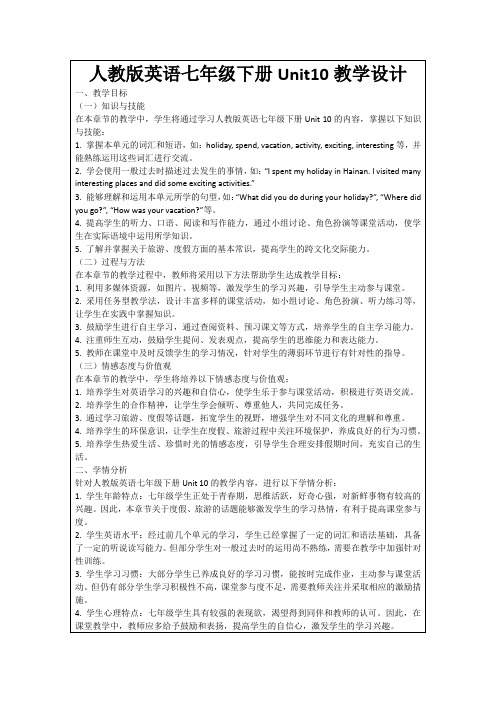
1.教师引导学生回顾本节课所学的知识点,如一般过去时的构成、用法、动词过去式变化规则等。
2.学生分享在本节课中的收获和感悟,教师给予肯定和鼓励。
3.教师强调本章节的重要性和实际应用价值,激发学生学习英语的兴趣和自信心。
4.教师布置课后作业,要求学生继续巩固一般过去时的运用,并为下一节课的学习做好准备。
难点:学生在口语表达时,如何能够自然、流畅地使用一般过去时,以及如何组织语言表达自己的旅游经历。
(二)教学设想
1.针对重难点的教学策略:
-利用多媒体教学资源,如视频、图片等,创设真实的旅游场景,让学生在情境中感知和运用一般过去时态。
-设计不同层次的教学活动,如小组讨论、个人陈述等,帮助学生从易到难地掌握一般过去时的用法。
2.采用任务型教学法,设计丰富多样的课堂活动,如小组讨论、角色扮演、听力练习等,让学生在实践中掌握知识。
3.鼓励学生进行自主学习,通过查阅资料、预习课文等方式,培养学生的自主学习能力。
4.注重师生互动,鼓励学生提问、发表观点,提高学生的思维能力和表达能力。
5.教师在课堂中及时反馈学生的学习情况,针对学生的薄弱环节进行有针对性的指导。
-完成课后练习,如填空、选择、回答问题等。
4.词汇积累:学生自主收集5个与旅游相关的词汇和短语,要求用英文解释其含义,并给出一个例句。此作业有助于扩大学生的词汇量,提高语言运用能力。
5.预习作业:预习下一节课的内容,提前了解新课中的词汇、语法点,为课堂学习做好准备。
-通过课堂互动,教师及时发现并纠正学生在时态运用上的错误,给予针对性的指导。
2.教学过程设计:
-导入新课:通过展示不同旅游目的地的图片,激发学生的兴趣,引导学生谈论自己的旅游经历,自然引入一般过去时的学习。
人教版七年级英语下册Unit10单元教学设计
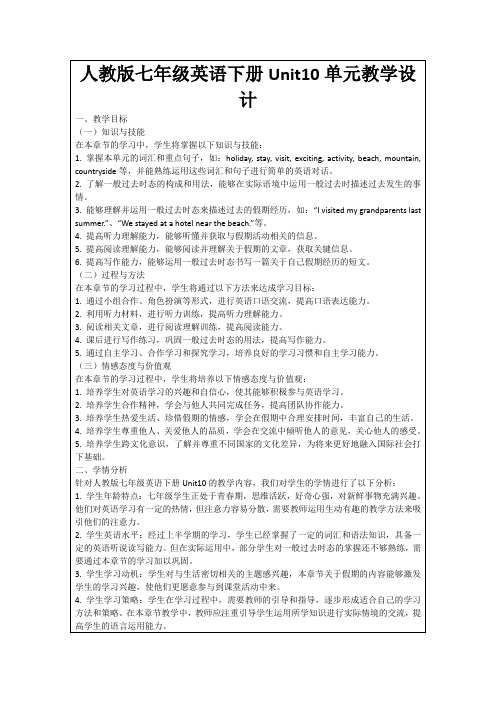
(三)学生小组讨论
在这一环节,我将组织学生进行小组讨论,以达到以下目的:
1.让学生相互交流,分享彼此的假期经历,提高口语表达能力。
-学生分组讨论,每人用英语介绍自己的假期经历,其他成员倾听并提问。
-各小组选代表进行汇报,展示讨论成果。
2.通过小组讨论,巩固一般过去时的用法,提高学生的语法应用能力。
4.词汇复习:复习本章节所学词汇,用思维导图或单词卡片的形式进行记忆。要求学生掌握单词的拼写、词义和用法。
-此作业有助于学生巩固词汇,提高词汇记忆效果。
-教师可组织词汇竞赛,激发学生的学习兴趣和竞争意识。
5.课后总结:请学生在本章节结束后,总结一般过去时态的用法、重点词汇和句型。要求用简洁明了的语言,形成笔记。
2.利用听力材料,进行听力训练,提高听力理解能力。
3.阅读相关文章,进行阅读理解训练,提高阅读能力。
4.课后进行写作练习,巩固一般过去时态的用法,提高写作能力。
5.通过自主学习、合作学习和探究学习,培养良好的学习习惯和自主学习能力。
(三)情感态度与价值观
在本章节的学习过程中,学生将培养以下情感态度与价值观:
2.了解一般过去时态的构成和用法,能够在实际语境中运用一般过去时描述过去发生的事情。
3.能够理解并运用一般过去时态来描述过去的假期经历,如:“I visited my grandparents last summer.”、“We stayed at a hotel near the beach.”等。
2.邀请学生分享自己的假期经历,鼓励他们用英语表达,为新课的学习做好铺垫。
-学生分享时,引导他们使用一般过去时描述过去的事情,如:“I went to the countryside last summer.”、“We had a picnic in the park.”等。
人教版七年级英语下册教学设计:Unit10SectionB1a1d

3.词汇巩固:要求学生用本节课所学的词汇,制作一张旅行主题的单词卡片,包括单词、音标、中文意思及例句。
4.口语练习:学生与家长或朋友进行角色扮演,模拟机场登机场景,用英语进行对话。家长或朋友可扮演机场工作人员,学生扮演旅客,练习一般将来时态的口语表达。
5.教育学生遵守公共秩序,如按时乘坐航班,尊重他人权益等。
6.培养学生的爱国情怀,让他们为祖国的繁荣富强感到自豪。
二、学情分析
针对本章节内容,七年级学生已具备一定的英语基础,对一般现在时态和一般过去时态有了初步的了解,但在实际运用中仍需巩固。此外,学生对旅行相关的话题较为感兴趣,这为本节课的教学提供了良好的情感基础。然而,学生在词汇量和听力理解方面存在一定差距,需要在教学中给予关注和指导。
2.学生进行角色扮演,模拟机场登机场景,练习一般将来时态的口语表达。
3.教师挑选部分学生的练习进行展示,给予评价和指导。
(五)总结归纳
1.教师带领学生回顾本节课所学词汇和一般将来时态的用法,总结重点知识。
2.学生分享学习心得,讨论在学习过程中遇到的困难和解决办法。
3.教师强调旅行中的文明礼仪,培养学生的道德品质,提升综合素质。
(二)讲授新知
1.教师呈现一张航班时刻表,引导学生学习新课的词汇,如:depart, arrive, delay等,并通过实例解释词汇含义,帮助学生理解记忆。
2.教师通过一个关于旅行计划的实例,引入一般将来时态的用法,讲解其结构:will +动词原形,并强调其用于描述未来的计划、预测和愿望。
3.教师邀请学生参与例句编写,巩固一般将来时态的用法,并进行课堂问答,检验学生对知识点的掌握。
人教版七年级下英语Unit 10教案、导学案

七年级英语·下新目标【人】Unit 10 I’d like some noodles.1.可数名词与不可数名词的区分。
2.点餐时的基本句型及交际运用。
3.some与any的运用。
4.培养学生从文章中获取细节,并进行归纳总结的能力,学生养成良好的阅读习惯。
以听说领先,在英语语境中大量感知和训练本单元的表示如何点餐的句型,养成良好的学习英语的习惯。
通过单元的语言学习,归纳总结如何点餐的句型以及可数名词与不可数名词的区分,使知识的记忆系统化。
采用Pair work和Group work相结合的方式,练习在饭店点餐的英文句型。
阅读活动设计为“读前、读中、读后”,每一步都设计了不同的任务或活动,重在培养学生的阅读策略和技能, 同时结合阅读材料进行拓展性语言训练和运用。
让学生在语言学习的过程中, 了解不同国家的饮食习惯。
教学突破:创设语境,重视听说能力,反复训练如何点餐。
在练习中正确使用What kind of …?注重方法与价值观的培养:以听说领先,结合图片的帮助在英语语境中大量感知和训练本单元的各种食物的名称和有关点餐的话题,学习would like的句型,养成良好的学习英语的习惯。
通过单元的语言学习,归纳总结would like句型、some和any的用法以及可数名词和不可数名词的语法知识,使知识的记忆形象化、系统化。
采用Pair work和Group work相结合的方式,练习点餐的英文句型。
通过大量的课堂练习,让学生对谈论饮食的话题感兴趣,并能运用所学的语言进行阅读写作练习,从语言学习的过程中,了解中西方饮食文化。
第一课时:Section A 1a-1c第二课时:Section A 2a-3c第三课时:Section B 1a-2c第四课时:Section B 3a - Self Check国外餐馆就餐礼仪在国外,一般的餐馆(非快餐性质)在门口均有带位员。
顾客进门后,带位员会首先问顾客同行有几位,然后带顾客入座。
人教版七年级英语下册第十单元同步教学设计
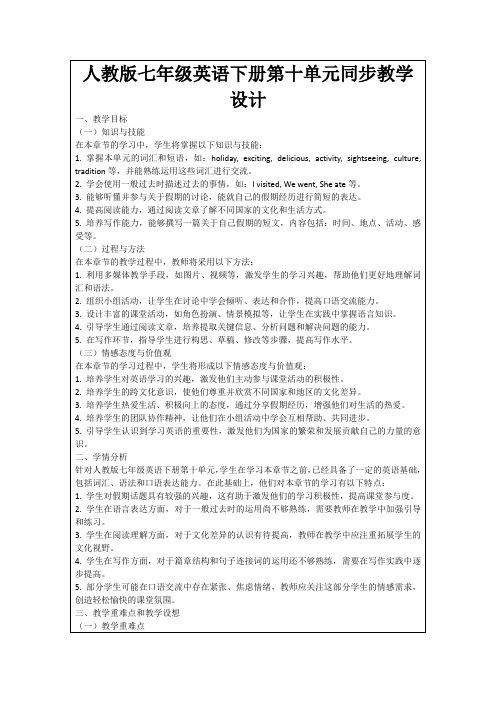
(二)讲授新知
1.教师呈现本节课的重点词汇和短语,如:holiday, exciting, delicious, activity, sightseeing, culture, tradition等,并通过例句展示它们在实际语境中的运用。
3.教师组织学生进行课堂练习,如填空、翻译、改错等,巩固词汇和语法知识。
(五)总结归纳
1.教师邀请学生回顾本节课所学内容,包括词汇、语法、阅读和写作技巧等。
2.教师引导学生总结一般过去时的用法,并提醒他们注意在实际交流中灵活运用。
3.教师强调学习英语的重要性,激发学生继续学习的动力,为下一节课的学习做好铺垫。
3.针对阅读教学,教师可以尝试以下设想:
(1)引导学生通过略读、寻读等策略,快速获取文章大意。
(2)设计问题链,引导学生深入理解文章细节,提高阅读理解能力。
(3)组织课堂讨论,让学生就文章中的文化现象进行交流,拓展文化视野。
4.针对写作教学,教师可以采用以下设想:
(1)提供写作框架和模板,指导学生进行篇章构思。
4.培养学生的团队协作精神,让他们在小组活动中学会互相帮助、共同进步。
5.引导学生认识到学习英语的重要性,激发他们为国家的繁荣和发展贡献自己的力量的意识。
二、学情分析
针对人教版七年级英语下册第十单元,学生在学习本章节之前,已经具备了一定的英语基础,包括词汇、语法和口语表达能力。在此基础上,他们对本章节的学习有以下特点:
2.教师讲解一般过去时的用法,引导学生观察并总结一般过去时的构成规律,如:动词过去式、时间状语等。
人教版英语七下Unit10SectionB(2a2c)教学设计

4.学生在情感态度方面,对于英语学习存在一定程度的分化,部分学生对英语学习兴趣浓厚,积极性高;而另一部分学生则存在畏惧心理,缺乏自信。教师应关注这部分学生的心理需求,激发其学习兴趣,提高其学习积极性。
人教版英语七下Unit10SectionB(2a2c)教学设计
一、教学目标
(一)知识与技能
1.学生能够理解并运用本节课所学的词汇和句型,如:“What time do you go to school?”, “I usually get up at 6:30.”等,来描述自己的日常作息时间。
2.学生能够运用一般现在时来谈论日常习惯,并能够根据实际情况进行灵活运用。
4.教学方法:采用问答、角色扮演等方式,让学生在实际语境中运用所学知识。
5.教学目标:使学生掌握一般现在时的用法,能够熟练描述自己的日常作息时间。
(三)学生小组讨论
1.教学内容:让学生分组讨论,分享自己的日常作息时间,并讨论如何合理安排时间。
2.教学活动:学生分成小组,用一般现在时进行讨论,记录下每个组员的作息时间。
4.教学目标:激发学生对本节课主题的兴趣,为新课的学习做好铺垫。
(二)讲授新知
1.教学内容:介绍一般现在时的用法,以及如何用英语描述日常作息时间。
2.教学活动:教师呈现一组图片,展示不同时间段的日常活动,引导学生用一般现在时进行描述。
3.教学语言:教师通过示例,讲解一般现在时的句子结构,强调主语与动词的变化。
(四)课堂练习
1.教学内容:针对本节课所学内容,设计难易适度的练习,巩固学生对一般现在时的掌握。
2.教学活动:完成教材中的2a-2c练习,并进行听力训练,提高学生的听力水平。
人教版初中七年级英语下册第十单元Unit10教案含教学反思

⼈教版初中七年级英语下册第⼗单元Unit10教案含教学反思第10单元I’d like some noodles.类别课程标准要求掌握的内容话题Food⾷物Section A 单词noodle n.⾯条beef n.⽜⾁potato n.⼟⾖;马铃薯would modal v.(表⽰意愿)愿意yet adv.还;仍然large adj.⼤号的;⼤的order n.& v.点菜;命令size n.⼤⼩;尺码bowl n.碗meat n.(可⾷⽤的)⾁special n.特⾊菜;特价品adj.特别的;特殊的cabbage n.卷⼼菜;洋⽩菜mutton n.⽺⾁tofu n.⾖腐短语would like愿意;喜欢take one’s order 点菜what size多⼤(尺⼨)one (large)bowl of…⼀(⼤)碗……what kind of哪⼀种……句型1.—What would you like? 您想要点什么?—I’d like some noodles. 我想要些⾯条。
2. Are there any vegetables in the beef noodles?⽜⾁⾯⾥有蔬菜吗?3. We’d also like gongbao chicken and some mapo tofu with rice.句型1. The number of candles is the person’s age.蜡烛的数量是过⽣⽇的⼈的年龄。
2. If he or she blows out all the candles in one go,the wish will come true. 如果他/她⼀⼝⽓吹灭所有的蜡烛,许的愿望便会成真。
3. They never cut up the noodles because the long noodles are a symbol of long life. 他们从不切碎⾯条,因为长长的⾯条是长寿的象征。
英语人教版七年级下册10单元教案七下
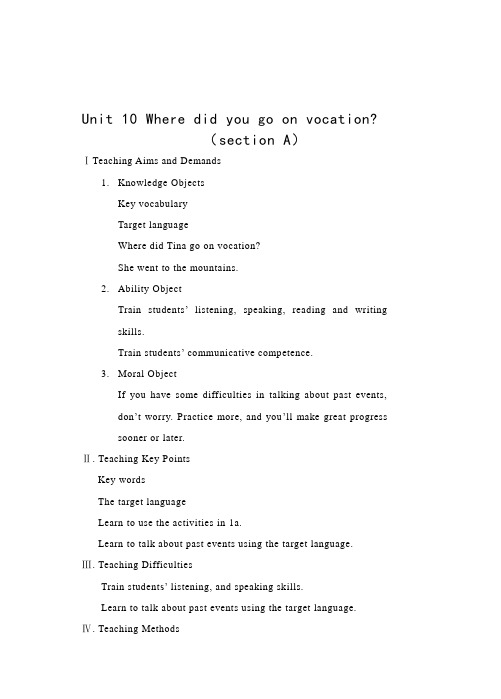
Unit 10 Where did you go on vocation?(section A)ⅠTeaching Aims and Demands1.Knowledge ObjectsKey vocabularyTarget languageWhere did Tina go on vocation?She went to the mountains.2.Ability ObjectTrain students’listening, speaking, reading and writingskills.Train students’ communicative competence.3.Moral ObjectIf you have some difficulties in talking about past events,don’t worry. Practice more, and you’ll make great progresssooner or later.Ⅱ. Teaching Key PointsKey wordsThe target languageLearn to use the activities in 1a.Learn to talk about past events using the target language.Ⅲ. Teaching DifficultiesTrain student s’ listening, and speaking skills.Learn to talk about past events using the target language.Ⅳ. Teaching MethodsScene teaching method.Listening and oral practice methods.Ⅴ. Teaching AidsA tape recorderA computerⅥ. Teaching ProceduresStepⅠGreetingGreet the class as usual.Check the homework.StepⅡ1a 1b1. Each picture shows something a person did I the past.Then ask students to name each activity.2. Play a recording of three conversations. These people aretalking about what they did on vacation. Listen and writethe numbers of the names in the boxes in the picture. StepⅢ1cWork with a partner, make conversations to talk about whatthe people in activity 1a went on vacation.StepⅣ2a 2b1. Play a recording of three conversations. These people aretalking about where they went on vacation. You are to listenand match the person with the place.2. Play the same recording again. Put a check mark under theheadline ” Yes, I did.” or “ No, I don’t.”StepⅤ2c Grammer Focus1. Place students into groups of three. Suppose one of you isNancy, one is Kevin and one is Julie. Now please ask eachother questions to talk about where you went on vacation asin the sample conversation.2. Ask students to read the questions and answers in pairs. StepⅥ3a 3bFill in the blanks with the word “was “ or “were” .Look at the pictures carefully and try to describe each one. StepⅦ 4Works in groups and talk about their photos.StepⅧSummarySummary the target language we’ve learned in this class. StepⅨHomeworkWrite a short passage to talk about one of your vacations.Blackboard DesignUnit 10 Where did you go on your vacation?(section B)ⅠTeaching Aims and Demands1.Knowledge ObjectsKey words.Target language.2.Ability ObjectTrain students’ listening, speaking, reading and writingskills.Train students’ communicative competence.Self-check.3.Moral ObjectⅡ. Teaching Key PointsThe key vocabulary.The target language.Ⅲ. Teaching DifficultiesTrain students’ reading and writing skills.Write a travel diary.Complete a questionnaire and make a survey.Ⅳ. Teaching MethodsListening, reading, writing and speaking methods.Practicing methodsGroup workⅤ. Teaching AidsA computerThe blackboard.Ⅵ. Teaching ProceduresStepⅠGreetingGreet the class as usual.Check the homework.StepⅡ1a 1b1. Point out the numbered list of words in the box. Read themand have students repeat several times.2. Ask, which words are happy words and which are unhappyones? Please put them in the correct blanks.StepⅢ2a 2b1. Listen to a conversation. Vera is talking about her vacation.Please listen and answer the question.2. Play the same recording again. You are to listen and writedown the answers to these things.StepⅣ2cStudent A is Vera’s friend and Student B is Vera. Get studentto role play the conversation in pairs.StepⅤ3a 3b1. Read the diaries carefully by yourselves. Circle the goodthings about the vacation and underline the bad things.2. Imagine you are an American student on vacation in Beijing.Please write a travel diary.StepⅥ 4Place students into groups of five. Imagine you are allforeigners on vacation in China. Take turns telling whatyou did on your vacation.StepⅦSelf-check 1 2 31. Ask students to check all the words they know.2. Ask students to write five new words in theirVocab-builder.3. Help students to make up questions about the topics in theform. Write the questions on a piece of paper.StepⅧSummarySummary the target language we’ve learned in this class. StepⅨHomeworkChoose the most interesting place you have ever been to and write a travel diary.Blackboard Design教学后记:Unit 10 Where did you go on your vacation?复习教案ⅠTeaching Aims and Demands4.Knowledge ObjectsReview to talk about past tense.5.Ability ObjectImprove students’ ability of listening, speaking, readingand writing skills.Improve students’ ability of communicative competence.6.Moral ObjectIf you have time, go to somewhere you like to have a goodtime. Not only will you enjoy the beauty of our country, youwill also feel better.Ⅱ. Teaching Key PointsThe key vocabularyThe target languageReview to talk about your vacations and describe them.Ⅲ. Teaching DifficultiesTrain students’ competence abilityⅣ. Teaching MethodsPairworkPracticing methodsⅤ. Teaching AidsA computerCardsⅥ. Teaching ProceduresStepⅠTalk about past eventsWrite a travel diaryGet students to write their own diary on an extra piece of paper. Encourage students to use a dictionary for some new words.Get the students who finished the writing first to write his or hers in the blackboard. Correct any spelling and grammar mistakes with the students.StepⅡReview the target languageWhere did you go on vacation?We went to New York.Did you go to Central Park?Yes, I did.How was the weather?It was humid.StepⅢReview the structureReview Past tense of regular and irregular verbs: was/were. StepⅣReview the key vocabularyWere, stayed, visited, felt, expensive, cheep, crowded, deliciousAfter reviewed these words, then have a dictation.StepⅤSummarySummary the target language we’ve reviewed in this unit. StepⅥHomeworkReview the target language and the key words in this unit.Blackboard Design教学后记:。
2020-2021学年人教版英语七年级下册Unit10教案

1.理论介绍:首先,我们要了解一般现在时态的基本概念。一般现在时态是描述习惯性动作或普遍真理的时态。它是英语学习中的基础时态,非常重要。
2.案例分析:接下来,我们来看一个具体的案例。这个案例展示了如何用一般现在时态描述日常活动,以及它如何帮助我们表达习惯性的行为。
3.重点难点解析:在讲授过程中,我会特别强调一般现在时态的构成和频率副词的使用这两个重点。对于难点部分,我会通过举例和比较来帮助大家理解。
五、教学反思
在Unit 10《Daily Life》的教学过程中,我注意到了几个值得反思的方面。首先,学生在掌握一般现在时态的疑问句构成上存在一定难度,这说明我在这一部分的教学可能需要更加细致和具体。我考虑在下一节课通过更多实际例句和互动提问,帮助学生更好地理解和运用疑问句。
其次,实践活动中的角色扮演活动,学生们表现得相当积极,这让我感到欣慰。但同时我也注意到,有些学生在口语表达上仍显得不够自信和流畅。为了提高他们的口语能力,我计划在接下来的课程中增加更多类似的活动,鼓励他们多开口说英语,增强信心。
-语法结构在真实语境中的应用:学生需要理解何时使用一般现在时态,并能在真实的交际情境中正确运用。
-阅读理解中的细节抓取:在阅读过程中,学生可能会在理解文章细节和推断作者意图时遇到困难。
-词汇的拼写和用法区分:某些词汇可能拼写相似,但用法不同,如get up与get on,学生需要区分记忆。
在教学过程中,教师应针对以上难点和重点进行有针对性的讲解和练习,通过实例、图表、游戏等多种教学活动,帮助学生透彻理解并掌握这些知识。
2. Section B:继续深化日常活动话题,引入一般现在时态的疑问句和否定句。
-学习疑问词:What time, How often。
人教版七年级英语下册Unit10(第十单元)优秀教案
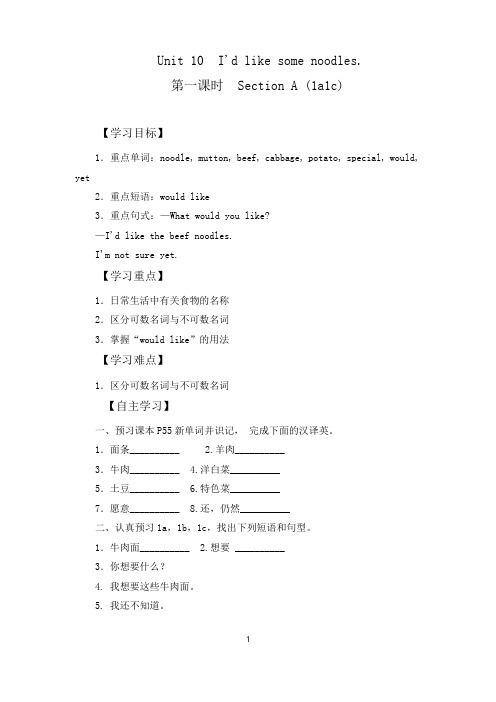
Unit10I'd like some noodles.第一课时Section A(1a1c)【学习目标】1.重点单词:noodle,mutton,beef,cabbage,potato,special,would, yet2.重点短语:would like3.重点句式:—What would you like?—I'd like the beef noodles.I'm not sure yet.【学习重点】1.日常生活中有关食物的名称2.区分可数名词与不可数名词3.掌握“would like”的用法【学习难点】1.区分可数名词与不可数名词【自主学习】一、预习课本P55新单词并识记,完成下面的汉译英。
1.面条__________ 2.羊肉__________3.牛肉__________ 4.洋白菜__________5.土豆__________ 6.特色菜__________7.愿意__________8.还,仍然__________二、认真预习1a,1b,1c,找出下列短语和句型。
1.牛肉面__________ 2.想要__________3.你想要什么?4.我想要这些牛肉面。
5.我还不知道。
【课堂导学】Step1情景导入Teacher:As we all know,we can't live without food.We have to eat something to keep us strong and healthy.Everyone has his own taste.So what kind of food do you like?What's your favorite food?Do you like noodles?What kind of noodles do you like?Today we'll talk about the kinds of noodles.环节说明:就学生感兴趣的身边的话题导入新课,简洁明了,引人入胜。
人教版英语七年级下册Unit10大单元教学设计
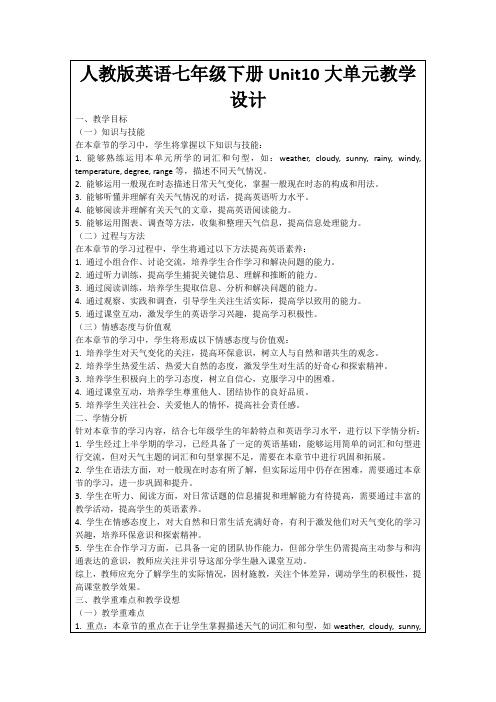
4.学生在情感态度上,对大自然和日常生活充满好奇,有利于激发他们对天气变化的学习兴趣,培养环保意识和探索精神。
5.学生在合作学习方面,已具备一定的团队协作能力,但部分学生仍需提高主动参与和沟通表达的意识,教师应关注并引导这部分学生融入课堂互动。
综上,教师应充分了解学生的实际情况,因材施教,关注个体差异,调动学生的积极性,提高课堂教学效果。
三、教学重难点和教学设想
(一)教学重难点
1.重点:本章节的重点在于让学生掌握描述天气的词汇和句型,如weather, cloudy, sunny,rainy, windy等,以及运用一般现在时态描述天气变化。
3.教师选取部分学生进行答案展示,针对共性问题进行讲解,提高学生的实际运用能力。
4.学生互相批改练习,培养合作学习意识,提高自我纠错能力。
(五)总结归纳
1.教师带领学生回顾本节课的学习内容,总结词汇、句型、语法等知识点。
2.学生分享自己在学习过程中的收获和感悟,互相鼓励,共同进步。
3.教师强调情感态度与价值观的培养,让学生认识到关注天气变化、保护环境的重要性。
2.能够运用一般现在时态描述日常天气变化,掌握一般现在时态的构成和用法。
3.能够听懂并理解有关天气情况的对话,提高英语听力水平。
4.能够阅读并理解有关天气的文章,提高英语阅读能力。
5.能够运用图表、调查等方法,收集和整理天气信息,提高信息处理能力。
(二)过程与方法
在本章节的学习过程中,学生将通过以下方法提高英语素养:
2.教师讲解一般现在时态的构成和用法,结合实际天气情况,进行示例演示,让学生在实际语境中感知语法规则。
新人教版七年级下册英语Unit10导学案
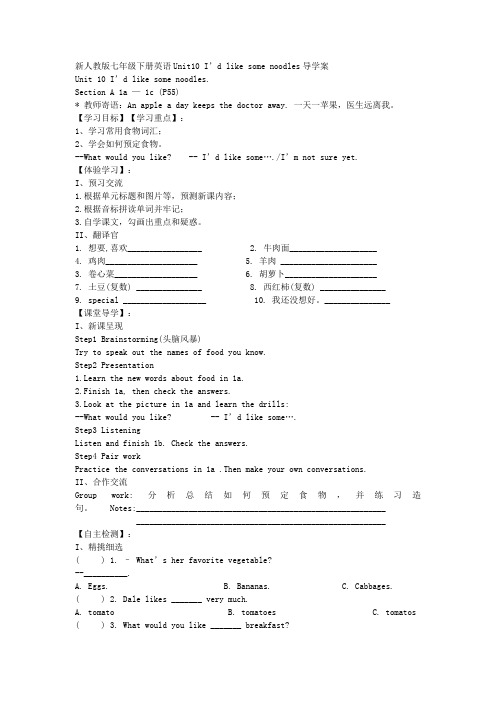
新人教版七年级下册英语Unit10 I’d like some noodles导学案Unit 10 I’d like some noodles.Section A 1a — 1c (P55)* 教师寄语:An apple a day keeps the doctor away. 一天一苹果,医生远离我。
【学习目标】【学习重点】:1、学习常用食物词汇;2、学会如何预定食物。
--What would you like? -- I’d like some…./I’m not sure yet.【体验学习】:I、预习交流1.根据单元标题和图片等,预测新课内容;2.根据音标拼读单词并牢记;3.自学课文,勾画出重点和疑惑。
II、翻译官1. 想要,喜欢_________________2. 牛肉面____________________4. 鸡肉_____________________5. 羊肉 ______________________3. 卷心菜___________________ 6. 胡萝卜_____________________7. 土豆(复数) _______________ 8. 西红柿(复数) _______________9. special ___________________ 10. 我还没想好。
_______________【课堂导学】:I、新课呈现Step1 Brainstorming(头脑风暴)Try to speak out the names of food you know.Step2 Presentation1.Learn the new words about food in 1a.2.Finish 1a, then check the answers.3.Look at the picture in 1a and learn the drills:--What would you like? -- I’d like some….Step3 ListeningListen and finish 1b. Check the answers.Step4 Pair workPractice the conversations in 1a .Then make your own conversations.II、合作交流Group work: 分析总结如何预定食物,并练习造句。
人教版七年级英语下册Unit10SectionB(1a1d)教学设计

一、教学目标
(一)知识与技能
1.学生能够理解并掌握本节课的重点词汇和句型,如:spring, summer, fall, winter, be good at, go skateboarding, go swimming, etc.,并能运用这些词汇和句型描述不同季节的天气特点及人们的活动。
三、教学重难点和教学设想
(一)教学重难点
1.重点:本节课的重点在于让学生掌握关于季节的词汇和句型,如spring, summer, fall, winter以及描述人们活动的短语be good at, go skateboarding, go swimming等。同时,学会运用一般现在时描述不同季节的活动。
2.互动教学:采用问答、小组讨论等形式,让学生在实际语境中运用所学词汇和句型,提高他们的口语表达能力。
3.听力训练:设计丰富的听力活动,如听季节描述、听人物活动等,让学生在听的过程中,培养捕捉关键信息的能力。
4.写作指导:在学生掌握词汇和句型的基础上,指导他们运用一般现在时和连接词组织段落,进行写作练习。
2.难点:学生需要掌握如何运用连接词First, Next, Then, Finally组织段落,使得描述内容连贯、有序。此外,听力训练中,学生需要在获取信息的基础上,进行整理、分析,提高信息处理能力。
(二)教学设想
1.创设情境:通过展示四季变化的图片和视频,激发学生对季节话题的兴趣,引导他们主动参与到课堂讨论中。
1.写作作业:请学生运用本节课所学的词汇、句型和一般现在时,写一篇关于自己或家人在不同季节活动的短文。要求条理清晰,语句通顺,不少于60词。
2.口语作业:与家长或同学进行对话,用英语讨论各自喜欢的季节及原因。每人至少提出三个问题,并回答对方的问题。
人教英语七年级下册第10单元教案教学设计

1.教师将学生分成小组,让他们用一般过去时态讨论以下话题:“Share your interesting experiences during the last summer vacation.”
2.学生在小组内轮流发言,尝试用一般过去时态描述自己的假期经历,组内其他成员认真倾听,给予评价和建议。
(二)过程与方法
1.采用情景教学法,让学生在真实的语境中学习英语,激发学生的学习兴趣。
2.运用任务型教学法,引导学生通过小组合作完成任务,培养学生的团队协作能力。
3.利用多媒体教学资源,如图片、视频等,帮助学生形象地理解和记忆单词、短语和句型。
4.创设丰富的课堂活动,如角色扮演、小组讨论、听力练习等,提高学生的英语实际运用能力。
2.教师通过讲解、举例等方式,详细解释一般过去时态的构成和用法,强调动词过去式的变化规则。
3.教师引导学生学习本节课的常用句型,如:“What did you do during your summer vacation?”、“I went to the beach with my family.”等,并让学生进行模仿练习。
5.鼓励学生进行自主学习,培养学生的自主学习能力和解决问题的能力。
(三)情感态度与价值观
1.培养学生对英语学习的兴趣和热情,提高学生的自信心,使其敢于开口说英语。
2.培养学生热爱生活,珍惜假期时光,懂得分享和关爱他人的品质。
3.增强学生的环保意识,教育学生在旅行过程中要注意保护环境,从小事做起。
4.通过学习本章节内容,使学生了解不同地域的文化差异,培养学生的跨文化交际意识。
c.写作:教师让学生编写一篇关于自己假期经历的短文,要求运用一般过去时态和本节课所学的词汇、句型。
人教英语七年级下册第10单元教案优秀教学案例
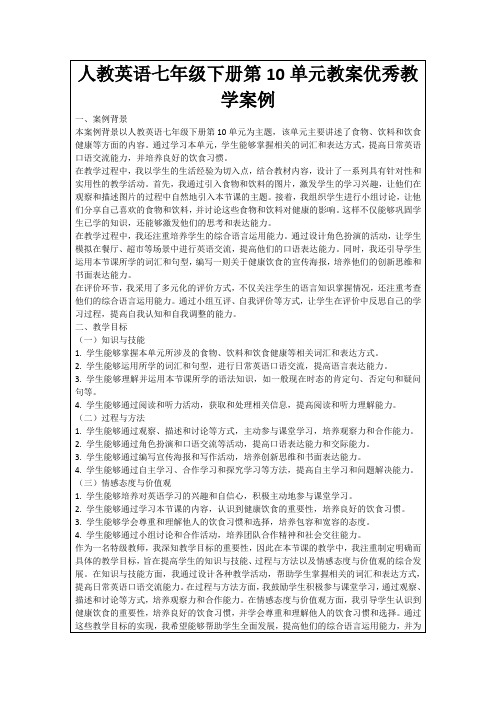
(一)导入新课
1.课堂开始时,我通过展示一些食物和饮料的图片,引发学生的兴趣和好奇心,激发他们对本节课主题的兴趣。
2.我向学生提问:“你们最喜欢的食物和饮料是什么?”让学生自由发言,分享他们的喜好,并简要介绍他们喜欢的食物和饮料的特点。
3.接着,我引导学生思考食物和饮料对健康的影响,让学生意识到健康饮食的重要性,为后续学习打下基础。
(四)反思与评价
1.教师引导学生进行自我反思,评估自己的学习效果,帮助学生发现自己的优点和不足,调整学习策略。
2.设计多元化的评价方式,如小组互评、自我评价等,让学生在评价中反思自己的学习过程,提高自我认知和自我调整能力。
3.教师根据学生的表现和反馈,及时调整教学策略和教学内容,以满足学生的学习需求。
4.鼓励学生参与评价过程,培养他们的评价能力和批判性思维。
作为一名特级教师,我深知教学策略的重要性,因此在本节课的教学中,我注重运用情景创设、问题导向、小组合作和反思与评价等教学策略。通过情景创设,我能够激发学生的学习兴趣和动机,提供丰富的语言输入,增强学生的语言感知和理解能力。通过问题导向,我能够引导学生思考和探索食物、饮料和饮食健康之间的关系,培养他们的问题解决能力和批判性思维。通过小组合作,我能够培养学生的团队合作精神和社会交往能力,提高他们的语言运用能力和思维能力。通过反思与评价,我能够帮助学生发现自己的优点和不足,调整学习策略,同时根据学生的表现和反馈,及时调整教学策略和教学内容,以满足学生的学习需求。通过这些教学策略的运用,我期望能够提高学生的综合语言运用能力,培养他们的自主学习能力和问题解决能力,并为他们的未来学习和生活打下坚实的基础。
(二)讲授新知
1.在导入新课之后,我进入本节课的主要内容,讲授食物、饮料和饮食健康相关的词汇和表达方式。
人教版英语七下Unit10SectionB(1a1d)教学设计

针对不同学生的学习需求,设计难易程度不同的练习,使每个学生都能在课堂上得到有效的训练。
4.听力训练,提高听力技巧
5.口语表达,增强自信
创设真实的语言环境,鼓励学生大胆开口,进行模仿、角色扮演等口语练习。同时,教师应及时给予鼓励和正面反馈,提高学生的自信心。
6.拓展延伸,巩固提高
人教版英语七下Unit10SectionB(1a1d)教学设计
一、教学目标
(一)知识与技能
在本章节的学习中,学生将通过学习人教版英语七下Unit10 Section B(1a-1d)的内容,掌握以下知识与技能:
1.掌握本节课的核心词汇,如: cleanliness, sweeping, washing, room, homework, exercise, habit等,并能正确运用这些词汇进行交流。
本章节的学习对象为七年级下学期的学生,他们经过前一阶段的学习,已经具备了一定的英语基础,能够运用简单的词汇和句型进行交流。在此基础上,学生们对于一般现在时态的掌握程度较好,但部分学生在运用频率副词和描述日常习惯时仍存在一定困难。此外,学生的听说能力有待提高,部分学生存在听力理解困难和口语表达不自信的问题。
2.教学方法:采用直观教学法,通过图片的展示,激发学生的兴趣和好奇心,引导学生进入本节课的主题。
3.教学目标:让学生初步了解本节课要学习的日常习惯相关词汇,为新知识的学习做好铺垫。
(二)讲授新知
1.教学内容:本节课的核心词汇(cleanliness, sweeping, washing, room, homework, exercise, habit等)和一般现在时态的运用。
4.关注学生的情感需求,鼓励他们积极参与课堂活动,培自信心,提高学习兴趣。
- 1、下载文档前请自行甄别文档内容的完整性,平台不提供额外的编辑、内容补充、找答案等附加服务。
- 2、"仅部分预览"的文档,不可在线预览部分如存在完整性等问题,可反馈申请退款(可完整预览的文档不适用该条件!)。
- 3、如文档侵犯您的权益,请联系客服反馈,我们会尽快为您处理(人工客服工作时间:9:00-18:30)。
人教版七年级英语下册第十单元学案2010-03-03 10:13:31| 分类:中学教案学案| 标签:|字号大中小订阅Unit10 When did you go on vacation?Section ATeacher’s word:A thousand-Li journey is started by taking the first step. (千里之行始于足下)一、教学目标:1、知识目标:Important words: camp, museum, guide, exam, really, rainy, fantastic,unfriendly, awfulImportant phrases: summer camp, study for exam, visit museum, onvacationSentences: 1). Where did you/he/she/they go on vacation?2). Did you/he/she/they go to central park?Grammar: 一般过去时2、能力目标:学会讨论过去发生的事件,并学会谈论节假日的活动。
3、情感目标:通过本部分的学习增强学生的活动能力,扩展地域常识。
二、学习过程:Step1: 预习导学并自主探究:A. 重点单词识记与拓展(试试看,加油!)1.guide(动词)________2.real (副词)________3. rain (形容词)_________4. friendly (反义词)__________5. center (形容词)__________B. 小小翻译官:1. 去度假________________2.夏令营________________3. 准备测试________________4. 参观博物馆____________5. 去中央公园____________6. 呆在家里_______________Step 2: 设情境导入新课:1). Do you like vacation? Why?2). Did you go on vacation?3). Where did you go?Step 3: 合作交流:Task1: Let the students do 1a. ( The students check the answers eachother)Task2: 听一听:Listen to 1b, 2a and 2b. (在听力中练习句型)----Where did he/she go on vacation?----- Did you go to ……….? ----- Yes or No.Task3: 说一说:Do pairwork using theses sentences above :Task4: 读一读,做一做:Let the students do 3a using was/were.Step4: 拓展创新:小组合作:你们一定去过很多地方,和谁去的?那儿的天气如何?最深的感受是什么?用英语讨论并完成下列表格。
Step5: 达标检测:(一)、根据首字母或汉语提示完成单词。
1. The boy is u_________ to others, so no people like him.2. I like reading on a r_________ day.3. He likes going c________ in Spring.4. They visited the __________ (博物馆).5. We were happy because we passed the _________(考试)(二)、单项选择。
( )1. ---_______ you go to London? --Yes, I did.A. DoB. DidC. DoesD. Are ( )2. Where did Jim go ______ vacation last summer?A. inB. onC. atD. to( )3. How ______ the people in Shanghai?A. beB. isC. wasD. were( )4. _______ was the weather like in New York?A. WhatB. HowC. WhenD. Who ( )5. I don’t like the restaurant, because the food is too _______.A. deliciousB. awfulC. fantasticD. inexpensive( )6. It was _______ yesterday, so we had to stay at home.A. rainB. rainedC. rainyD. rains (三)、根据上下文补全对话。
The two students came back to school after a long vacation.A: Hi, Bob! How are you? 1________________________________? A: It was great.B: 2_______________________________?A: I went to New York. It’s my favorite city.B: Yeah, I love New York3____________________it’s so expensive.4_______________________.A: We went to museum and we went to the movies.B: And 5_______________________ there?A: It was hot., but we didn’t mind it.(四)中考链接:1. Kevin _____ to work in his hometown after he granduated fromuniversity.A. goesB. wentC. will goD. hadgone2. --Jack, where’s my small round mirror? --Sorry, Betty, I _______it.A. breakB. brokeC. will breakD. am breaking三、课后反思这节课我学到的:__________________________________________________________本节课我的困惑:_______________________________________________________Unit10 When did you go on vacation?Section BTeacher’s word:Traveling can make you get more knowledge. (旅行能让你获得更多的知识)一、教学目标:1、知识目标:Important words: delicious, expensive, crowded, cry, corner, feel, back,decideImportant phrases: think of, all day (morning), have great fun,playing, inthe corner, be lostGrammar: 一般过去时(二)2、能力目标:学会以日记的形式记录一天的活动并表达自己的感情。
3、情感目标:通过叙述过去的事情,培养学生的逻辑表达能力和他们对大自然及生活的热爱之情。
二、学习过程:Step 1: 预习导学并自主探究:(单词、短语自测)1. expensive (反义词) _________2. make (过去时) _________3. 思考、考虑____________4. 玩得高兴______________5. 在角落里_______________6. 步行去旅行馆_______________7. 写一份报告_______________8. 决定干某事__________________Step 2: 导入新课:Last lesson we talked about some vacations and learned the past tense.This lesson we’ll go on learning them.Step 3: 合作交流:Task1: Let the students do 1a and 1b (进一步巩固单词),and thestudents check the answers each other.Task2: Listen to 2a and 2b.Task3: Do pairwork using the form below:-----Where did ? -----What did ?-----Did you ? -----How was/were .? Task4: Let the students read 3a then circle the good things and underlinethe bad things about his vacation.Step4: 重要知识点拓展:1. make 表示“使,让”时,其常用固定短语有make sb do sth“让某人干什么”,还有使得某人怎么样时为:make sb + 形容词。
例如:1). I made my little sister cry yesterday.2). My cat died. It made me sad.2. decide 意思是“决定,下决心”,其固定短语为decide to do sth译为“决定做某事”相当于make a decision to do sth 例如:I decide to go home. = I make a decision to go home.3.help 译为“帮助”,其固定短语有help sb (to) do sth “帮助某人做某事”,help sb with sth “在某方面帮助某人”例如:1). Tom often helps us with our English.2). Tom often helps us to study English.Step5: 达标检测:(一)、根据首字母或汉语提示完成单词。
